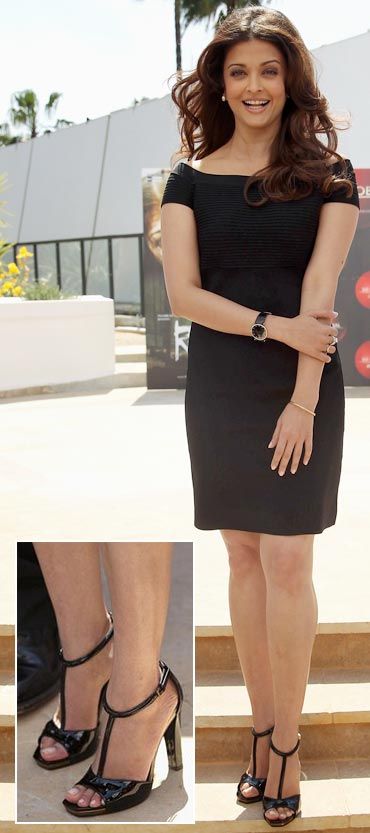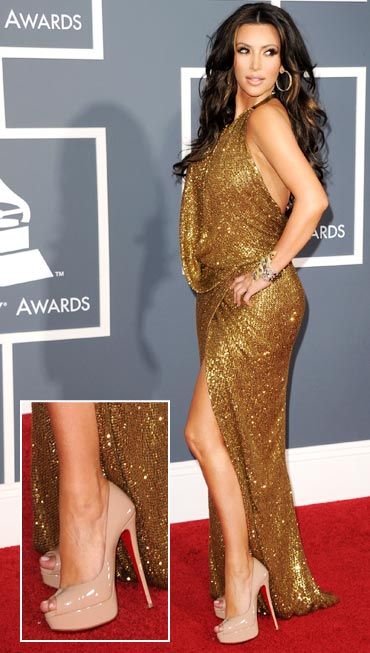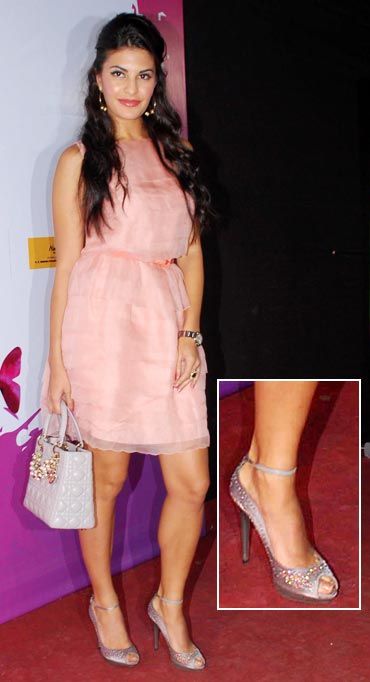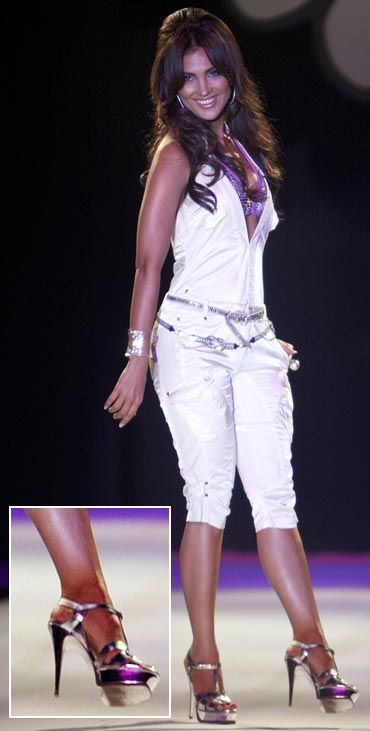Photographs: Sean Gallup/Getty Images
If you're obsessed with heels, it's time you learned how they can affect your health!
There's no doubt about it -- women feel more attractive and confident of themselves whenever they put on a pair of beautiful high-heeled shoes. It's a feminine joy to look taller and it makes you look slimmer too.
And of course, the shoes themselves look great -- a pair of gorgeous stilettos can rightly set off practically any outfit. There are women whose love of high heels becomes a part of their persona and with the style factor attached, it's virtually a law that no wardrobe is complete without a pair of teetering beauties.
Despite their appeal, however, there are growing concerns over the harmful effects high heels have on your health. In the following pages, we take a look at the complications that can arise from wearing them too often -- and you'll be surprised to know that it's not just your feet that are likely to suffer!
Posture
Image: Notice how Kim Kardashian's posture in such huge heels has her leaning backwardPhotographs: Jason Merritt/Getty Images
Wearing a high-heeled shoe positions the foot downward, thereby putting more pressure on the forefoot. This requires the rest of the body to adjust. Since the lower half of the body stretches forward towards the toes, the torso has to stretch backward to maintain balance. This affects normal posture. As a result, many women who wear high heels frequently complain about back pain.
Gait
Image: Walking in heels is tough -- just ask Malaika Arora Khan, who's perpetually in themPhotographs: Pradeep Bandekar
High heel shoes affect the way you walk. Whenever the body exerts pressure on the forefoot, the legs are not able to exert a balanced, adequate force on the ground while walking. This in turn puts pressure on the hip flexor muscles in the legs. These muscles work harder to move the body forward. Also, the knees remain bent and this affects the knee muscles too.
Balance
Image: Marisa Miller's pink beauties look like they need her to watch her balance constantly!Photographs: Jason Merritt/Getty Images
It needs a lot of balancing skills to walk in a pair of high-heeled shoes. The foot and the ankle tend to move outward and this becomes a threat to maintaining your balance.
Pressure on the back
Image: Sofia Hayat's two-tone pair is the latest thing, but they put a lot of pressure on the backPhotographs: Pradeep Bandekar
The stress on the vertebral column in your back is reduced by its natural 'S' shape, which performs the role of shock absorber. Wearing high heels can lead to flattening of the lumbar vertebra (the area of the vertebral column located in the lower back, which takes on the most pressure) along with the displacement of the thoracic spine (area of the vertebral column located in the mid- and upper-back area, at the same level as the ribcage) in the backward direction. Since the upper part of the body leans forward, the body tries to maintain balance by decreasing the forward curve of the lower back. This alignment is unhealthy and it leads to lower back pain.
Hips
Image: Heidi Klum hardly needs to boost her height, but she does so anyway in a vertigo-inducing pairPhotographs: Jason Merritt/Getty Images
When the feet remain flexed in a downward position, they lose some power to make forward movements. This brings the hip flexor muscles present in the upper part of the thighs into action to facilitate movement of the body. But overuse can lead to a shortening or a contracture of the muscles. This further leads to the flattening of the lumbar spine.
Knees
Image: Those shoes are lovely, but better watch the knees, Jacqueline!Photographs: Pradeep Bandekar
Women run a greater risk of suffering from knee osteoarthritis. The reason can be attributed to the use of high-heeled shoes to certain extent. Wearing high heels keeps the knees in a bent position while the tibia or the shin bone leans inward. The inside of the knee, which is the site of osteoarthritis, faces considerable stress. High heels increase the gap between the knee and the floor, thereby putting greater pressure on the knees. This can lead to osteoarthritis.
Ankles
Image: Brooklyn Decker's red patents are hot, but then height shortens the calf musclesPhotographs: Andreas Rentz/Getty Images
The ankle joints lose power to facilitate movements over time due to prolonged use of high heels. The heel height shortens the calf muscles. These shortened muscles cannot work properly while pushing the foot to move forward.
Feet
Image: Lara Dutta seems to be showing off her silver heels, but they have a devastating effect on the feetPhotographs: Manav Manglani/Reuters
Your feet suffer the maximum damage due to high heels. The bottom of the forefoot experiences significant pressure while remaining in a downward position. The pressure on the bottom of the forefoot increases by around 76 percent with 3.5" heels. The extra pressure on the feet can lead to deformities like hammer toes, bunions, neuromas and bunionettes.
Skin
Image: Victoria Beckham has painful bunions on her feet as a result of such heels -- but still wears them!Photographs: Frazer Harrison/Getty Images
The narrow, pointed toes on high-heeled shoes tightly accommodate the feet. This causes corns, calluses and blisters.
Keeping these harmful effects of high heels in mind, it still cannot be expected that women totally give up the idea of wearing them! But you can restrict their use to special occasions. Regular wear of high heels can give birth to chronic ailments. A heel with a height of 1.5 inches is healthy and women can use them for daily purposes.












Comment
article